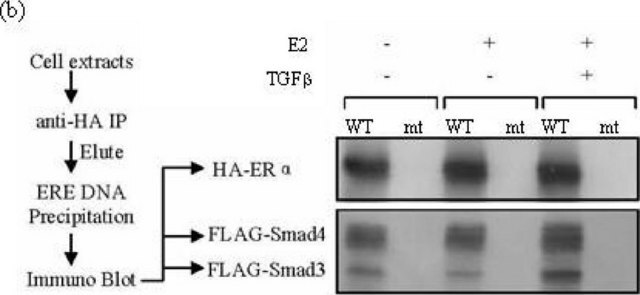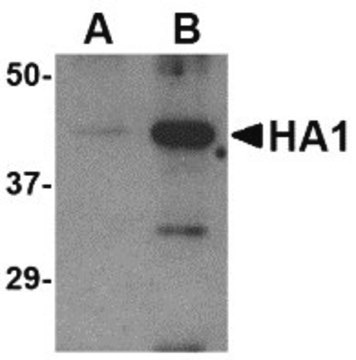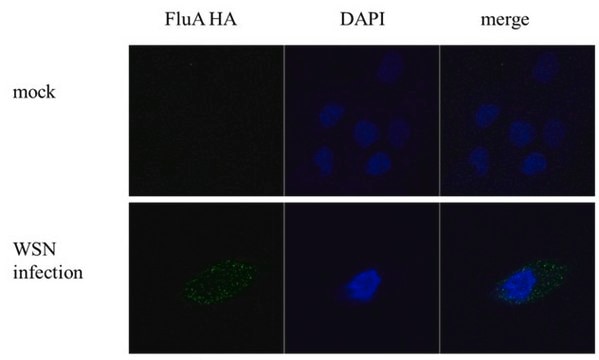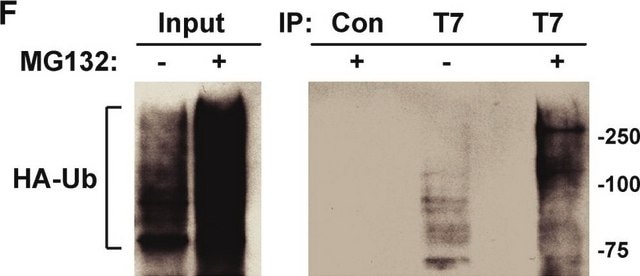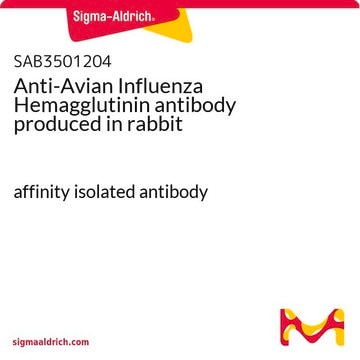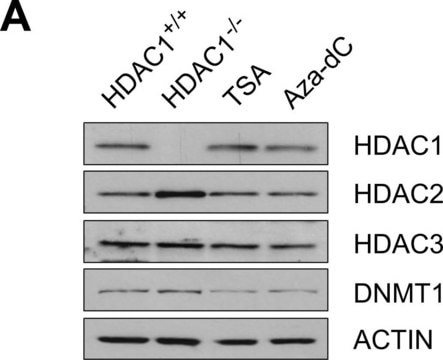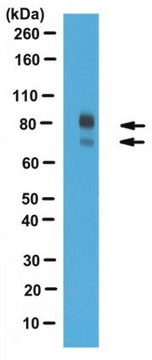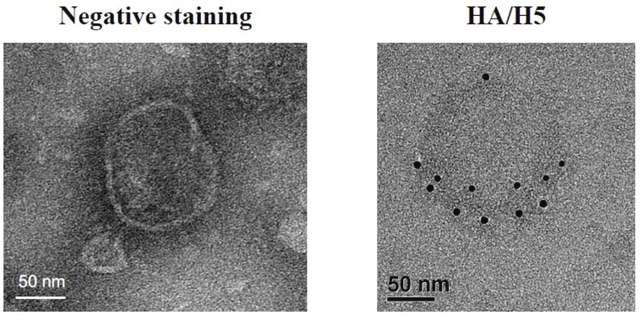SAB3500873
Monoclonal Anti-HEMAGGLUTININ antibody produced in mouse
clone 7B9B2, affinity isolated antibody
Sign Into View Organizational & Contract Pricing
All Photos(1)
About This Item
UNSPSC Code:
12352203
NACRES:
NA.41
Recommended Products
biological source
mouse
Quality Level
conjugate
unconjugated
antibody form
affinity isolated antibody
antibody product type
primary antibodies
clone
7B9B2, monoclonal
form
buffered aqueous solution
species reactivity
virus
concentration
1 mg/mL
technique(s)
ELISA: suitable
immunoblotting: suitable
NCBI accession no.
shipped in
wet ice
storage temp.
−20°C
target post-translational modification
unmodified
Related Categories
General description
Hemagglutinin [Influenza A virus (A/chicken/Jilin/9/ 2004(H5N1))] is the principal surface antigen of influenza A virus. Hemagglutinin (HA) is a homotrimer; each monomer is a single polypeptide (HA0) that is post transcriptionally cleaved by host proteases into two subunits (HA1 and HA2). HA2 is highly conserved across different strains of influenza virus. HA preferentially binds to α2-3 sialic acid receptor in aves, whereas in human it binds to α2-6 sialic acid receptor.
Immunogen
Antibody was raised against a peptide corresponding to 13 amino acids in the middle of the Hemagglutinin protein.
Biochem/physiol Actions
Hemagglutinin (HA), specially HA2 is responsible for the binding of the virus to host receptors and enables its entry into the host cell through endocytosis through endosomal membrane fusion. HA is the primary target for neutralizing antibodies. HA is a potent target for drug and vaccine development.
Features and Benefits
Evaluate our antibodies with complete peace of mind. If the antibody does not perform in your application, we will issue a full credit or replacement antibody. Learn more.
Physical form
Supplied at 1 mg/mL in PBS with 0.02% sodim azide.
Disclaimer
Unless otherwise stated in our catalog or other company documentation accompanying the product(s), our products are intended for research use only and are not to be used for any other purpose, which includes but is not limited to, unauthorized commercial uses, in vitro diagnostic uses, ex vivo or in vivo therapeutic uses or any type of consumption or application to humans or animals.
Not finding the right product?
Try our Product Selector Tool.
flash_point_f
Not applicable
flash_point_c
Not applicable
Certificates of Analysis (COA)
Search for Certificates of Analysis (COA) by entering the products Lot/Batch Number. Lot and Batch Numbers can be found on a product’s label following the words ‘Lot’ or ‘Batch’.
Already Own This Product?
Find documentation for the products that you have recently purchased in the Document Library.
Monoclonal antibodies against the fusion peptide of hemagglutinin protect mice from lethal influenza A virus H5N1 infection
Prabhu N, et al.
Journal of Virology, 83(6), 2553-2562 (2009)
Structure and receptor specificity of the hemagglutinin from an H5N1 influenza virus.
Stevens J, et al.
Science, 312(5772), 404-410 (2006)
C Buxton Bridges et al.
The Journal of infectious diseases, 181(1), 344-348 (1999-12-23)
The first outbreak of avian influenza A (H5N1) occurred among humans in Hong Kong in 1997. To estimate the risk of person-to-person transmission, a retrospective cohort study was conducted to compare the prevalence of H5N1 antibody among health care workers
K F Shortridge et al.
Virology, 252(2), 331-342 (1999-01-08)
The transmission of avian H5N1 influenza viruses to 18 humans in Hong Kong in 1997 with six deaths established that avian influenza viruses can transmit to and cause lethal infection in humans. This report characterizes the antigenic and biological properties
D J Alexander
Veterinary microbiology, 74(1-2), 3-13 (2000-05-09)
Only type A influenza viruses are known to cause natural infections in birds, but viruses of all 15 haemagglutinin and all nine neuraminidase influenza A subtypes in the majority of possible combinations have been isolated from avian species. Influenza A
Our team of scientists has experience in all areas of research including Life Science, Material Science, Chemical Synthesis, Chromatography, Analytical and many others.
Contact Technical Service